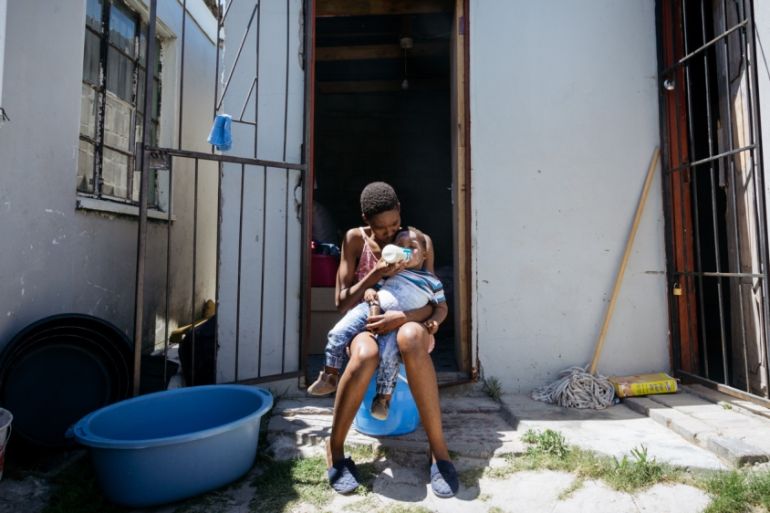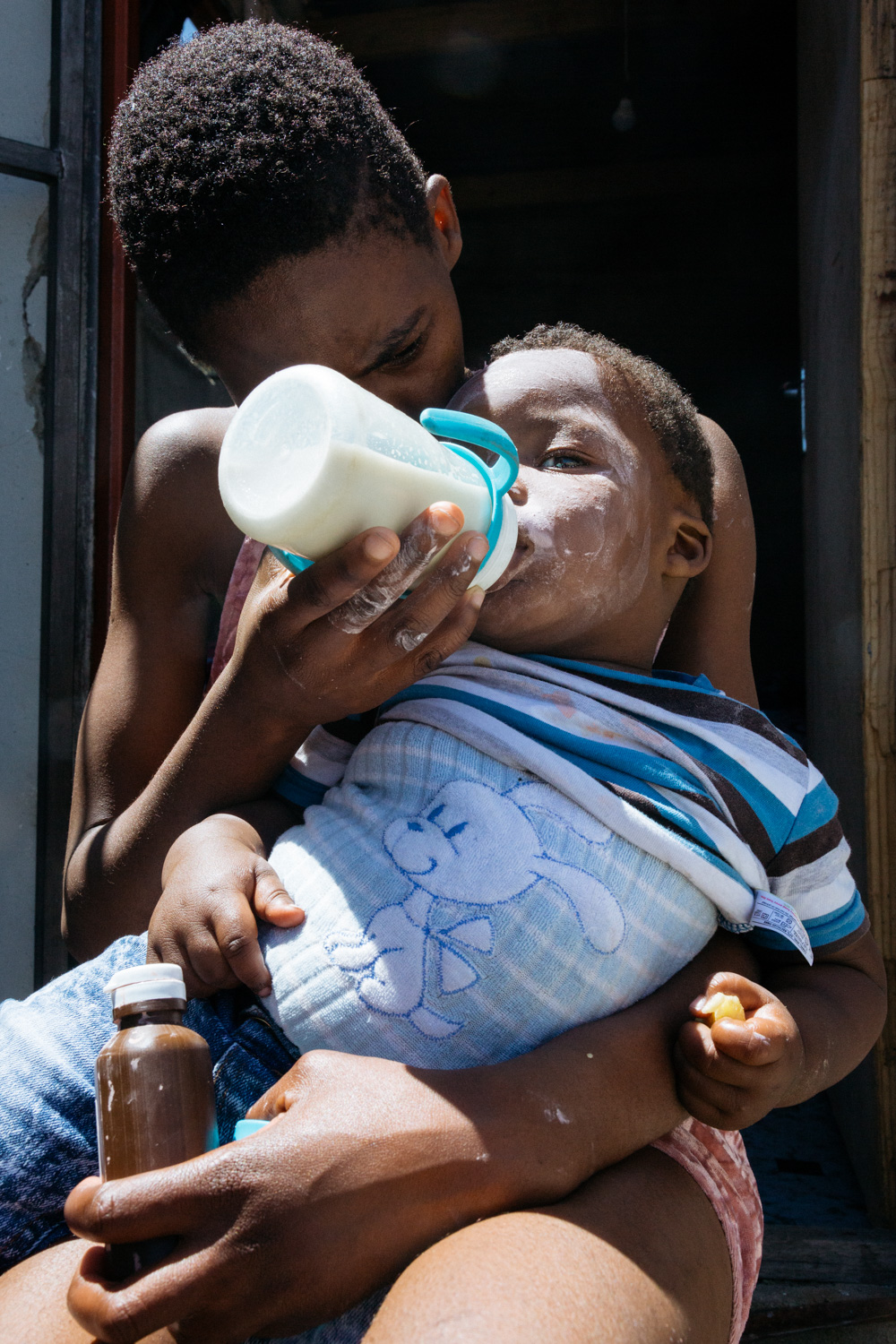The families facing generations of statelessness in South Africa
In Cape Town’s Phillipi township, one woman is fighting to secure nationality for herself and her child.

In the final instalment of a four-part series on stateless children in South Africa, one woman explains how statelessness has a knock-on effect which spans generations.
Luthando*, 28: ‘I went to court and I won the case but I am still stateless’
It has taken years for Luthando, 28, to be recognised as a South African citizen, even though she believes she was born here, albeit to undocumented migrant parents.
Keep reading
list of 4 itemsPalestinian Prisoner’s Day: How many are still in Israeli detention?
‘Mama we’re dying’: Only able to hear her kids in Gaza in their final days
Europe pledges to boost aid to Sudan on unwelcome war anniversary
The law in South Africa states that if you are born in South Africa and you have no other nationality, then you are South African. In practice, however, it does not always work this way.
Furthermore, even though Lawyers for Human Rights, which has been fighting cases on behalf of migrants and refugees in South Africa for the past 30 years, won an important victory when the courts recognised Luthando as South African several months ago, she has yet to receive her much-needed documents or those for her one-year-old son, Bandile*.
Luthando cannot be certain where her parents came from. Her mother, whose nationality she does not know, died when she was five years old.
“My dad told me that they came in from Zimbabwe,” she says.
|
|
After he died in 2010, when she was still a teenager, she was unable to complete her schooling because she did not have a birth certificate.
“When I later did research about my surname, I found that it actually belongs to Swaziland,” she explains.
Luthando sits on the double bed that fills the small outbuilding in Cape Town’s Phillipi township where she lives. She moves a stuffed animal out of the way with her foot. Since her case was first lodged five years ago, she has had a baby of her own. Her son has inherited his mother’s statelessness; without a nationality, she cannot pass a nationality onto her child.
I want my son to have a better life. He mustn't suffer like I did
Without any documentation, it was difficult for Luthando to find work, but she found many people who wanted to exploit her.
“When you don’t have documents and you are looking for a job, other people want to make you a sex slave.” She shudders despite the heat and rubs her shoulder.
“I remember the day this white guy here in Cape Town promised he was going to give me R1000 (about $70) and then take me overseas, to Europe.” This, she says, is how many women like her fall victim to human trafficking and drug smuggling.
Behind her, Bandile waddles in the sun and the dust. Phillipi is considered one of the most dangerous townships in the country, with high unemployment adding fuel to the fire of widespread violent crime and gang-related activities. Luthando cannot wait to leave this place. She lived on the streets of Johannesburg after the death of her father, and says she misses the hustle and bustle of the urban metro. “Cape Town is so slow,” she laughs.
She picks her son up and places him on her lap, feeding him formula from a bottle. “He is so big,” she laments, “and he eats so much. This formula is expensive.” When he has had his fill, she reaches into a plastic bag and brings out a small bottle of calamine lotion, applying the pink mixture sparingly to his skin.
His body is covered with raised bumps that are starting to scab over. His skin is pink in places where he has scratched the scabs off. When he became ill just over a week ago, Luthando managed to collect R230 ($16) to pay a private doctor to see him. Despite the letter from the court, public clinics still will not assist them, she says.
The doctor told her that Bandile is suffering from a viral infection, but did not say which one. Because of their lack of documentation, her son has not been immunised against any of the common childhood diseases. She cannot afford the private fees to have him vaccinated.

“I’m stateless. I don’t have documents. I went to court and I won the case but I am still stateless,” Luthando says.
The first thing she wants to do when she receives her South African identity document is to enrol in school. “I must start at Grade 11, and do two years to finish. It’s going to make such a big difference because then I can pursue my dreams.” She smiles. “I want to be a pilot.”
She used to watch planes passing overhead when she was younger and knew that one day she wanted to fly. “We would see the people who fly planes, they were educated and I liked that. I used to think that us black people, we’re not involved in many things. Especially women, because it’s rare to see a black woman in that industry.”
She becomes animated as she talks about how she once heard on the news that South Africa had the first black female fighter pilot on the continent. This, she says, gives her hope that she can achieve her dreams too. Achieving her goals is important, not just for herself. “I want my son to have a better life. He mustn’t suffer like I did.”
A broken system
Liesl Miller is the attorney who heads up the statelessness project at Lawyers for Human Rights. She says statelessness is much more common than most people realise. “I would say that we don’t have a lot of people in South Africa who should be stateless in terms of the law, because the law is very good,” she says, sitting in her office in Braamfontein, Johannesburg.
“The law makes provision for most people to get nationality if they are stateless in South Africa. The problem in South Africa is that there is not proper administrative justice.”
The system, she says, is broken. “That’s always the issue with South Africa. We have wonderful laws and our laws are well written and in line with international laws but we don’t implement them.”
Many of her clients are children, and many were even born to South African parents in South Africa. Despite this, it often takes years and costs millions of rand in legal fees for them to be recognised and protected by law.
Lawyers for Human Rights has seen only 10 cases where stateless people have been granted nationality over the past seven years.
It is nearly impossible to estimate how many people in South Africa are stateless, because as Miller says: “By the very nature of it all, undocumented people are invisible.” The numbers are high though, and her three-person team sees over 700 cases a year.
Earlier this year, she assisted the ABBA Children’s Home in Pretoria to get the births of 33 foundling children registered after the Department of Home Affairs refused to register more than two children for the home per month.
“The home receives very young children who have been abandoned, and before the child can be put on the register to be considered for adoption, that child needs a birth certificate.” Many of the babies had been abandoned or placed in “baby bins” – special receiving containers where women can leave babies they are not able to care for, knowing they will be safe.
The children are usually less than a week old, and almost nothing is known about their parents or their circumstances.
Miller lodged an urgent court case to force the department to prioritise vulnerable cases. Once the case was filed, the department offered to settle and registered all 33 children within the space of a month, “which shows you that they can do it, but by that stage, I had also spent a lot of our funds on paying the sheriff, paying the council, printing …,” she says. “So it was completely useless and totally unnecessary.”
On the walls behind her are pictures scribbled by young artists, notes of thanks from former clients, and bookshelves lined with numbered files filled with case after case that she has fought over the past seven years.
“Making sure that your population is documented and has access to nationality and a state is something that is crucial to your developments in your country. It is also crucial for peace,” she adds.
*Name changed to protect identity
This reporting was supported by Media Monitoring Africa (MMA) as part of the Isu Elihle Awards.